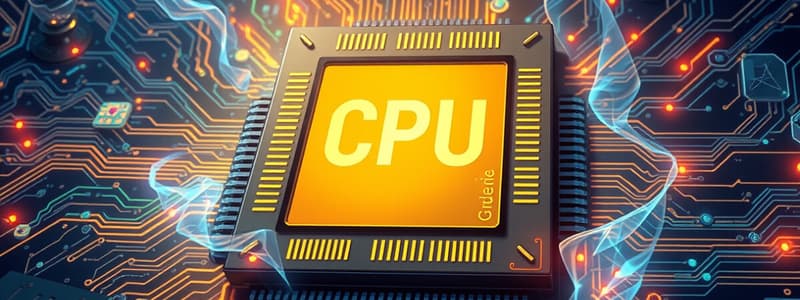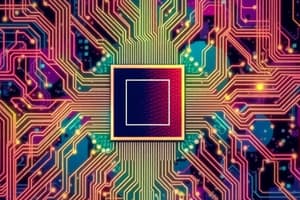Podcast
Questions and Answers
What is the primary role of the CPU in a computer?
What is the primary role of the CPU in a computer?
- Manage power supply
- Control input and output devices
- Execute instructions and perform calculations (correct)
- Store data permanently
Which of the following is NOT part of a CPU's architecture?
Which of the following is NOT part of a CPU's architecture?
- Hard Disk Drive (correct)
- ALU (Arithmetic Logic Unit)
- Cache Memory
- Control Unit
What is the significance of the CPU's clock speed?
What is the significance of the CPU's clock speed?
- It is the speed at which RAM operates.
- It determines how fast the CPU processes instructions. (correct)
- It controls the power supply efficiency.
- It indicates the amount of cache memory.
What does overclocking a CPU involve?
What does overclocking a CPU involve?
Which type of memory is volatile and used for temporarily holding data while a computer is running?
Which type of memory is volatile and used for temporarily holding data while a computer is running?
Which storage device uses spinning magnetic disks to read and write data?
Which storage device uses spinning magnetic disks to read and write data?
What is an SSD's primary advantage over an HDD?
What is an SSD's primary advantage over an HDD?
What does the motherboard's chipset control?
What does the motherboard's chipset control?
Which of the following is a non-volatile memory type used for storing essential firmware?
Which of the following is a non-volatile memory type used for storing essential firmware?
What is the function of a network interface card (NIC)?
What is the function of a network interface card (NIC)?
Which type of port is typically used to connect a monitor to a computer?
Which type of port is typically used to connect a monitor to a computer?
Which of these expansion cards enhances a computer's ability to render high-quality graphics?
Which of these expansion cards enhances a computer's ability to render high-quality graphics?
What is the purpose of a computer's power supply unit (PSU)?
What is the purpose of a computer's power supply unit (PSU)?
What type of memory is cache memory?
What type of memory is cache memory?
Which of the following is used for wired network connections?
Which of the following is used for wired network connections?
What technology is commonly used for cloud storage?
What technology is commonly used for cloud storage?
What is the role of a sound card in a computer?
What is the role of a sound card in a computer?
What type of connector would you use to supply power to a motherboard?
What type of connector would you use to supply power to a motherboard?
Which of the following is a portable storage device that connects via USB?
Which of the following is a portable storage device that connects via USB?
Flashcards are hidden until you start studying
Study Notes
CPU (Central Processing Unit) Fundamentals
- The CPU executes instructions and performs calculations, serving as the primary component for processing tasks in a computer.
- Key components of CPU architecture include the ALU (Arithmetic Logic Unit), Control Unit, and Cache Memory. The Hard Disk Drive is not part of this architecture.
- The CPU's clock speed directly affects how fast it processes instructions, serving as a critical performance metric.
Overclocking and BIOS/UEFI
- Overclocking involves running a CPU at a higher clock speed than it is rated for, enhancing performance but potentially causing overheating.
- BIOS/UEFI settings are stored in a CMOS battery located on the motherboard, allowing for system configuration.
Memory Types and Functions
- Volatile memory like RAM is used temporarily to hold data while a computer is operational, contrasting with non-volatile memory types such as ROM.
- Cache memory serves as a fast, temporary storage medium between the CPU and RAM, speeding up access to frequently used data.
Storage Devices
- Hard Disk Drives (HDD) utilize spinning magnetic disks to read and write data, while Solid-State Drives (SSD) are known for their faster access and transfer speeds.
- SSDs offer superior performance compared to HDDs, despite generally having less storage capacity and being more expensive.
Motherboard and Chipset
- The motherboard's chipset controls data flow between the CPU, RAM, and other components, playing a crucial role in overall system performance.
- Power supply units (PSU) convert electrical energy into the appropriate voltage and current needed for computer components.
Networking and Connectivity
- Network Interface Cards (NIC) connect computers to networks, facilitating communication between devices.
- Ethernet ports are primarily used for wired network connections, while monitors typically connect through HDMI or other display ports.
Expansion Cards
- Graphics cards enhance a computer's ability to render high-quality graphics and are essential for gaming and design tasks.
- Sound cards improve audio input/output quality, providing better sound experience for users.
Power and Storage Expansion
- A 24-pin ATX connector supplies power to a motherboard, ensuring proper voltage for operation.
- Flash drives are portable USB storage devices, making data transfer convenient and accessible.
Studying That Suits You
Use AI to generate personalized quizzes and flashcards to suit your learning preferences.




